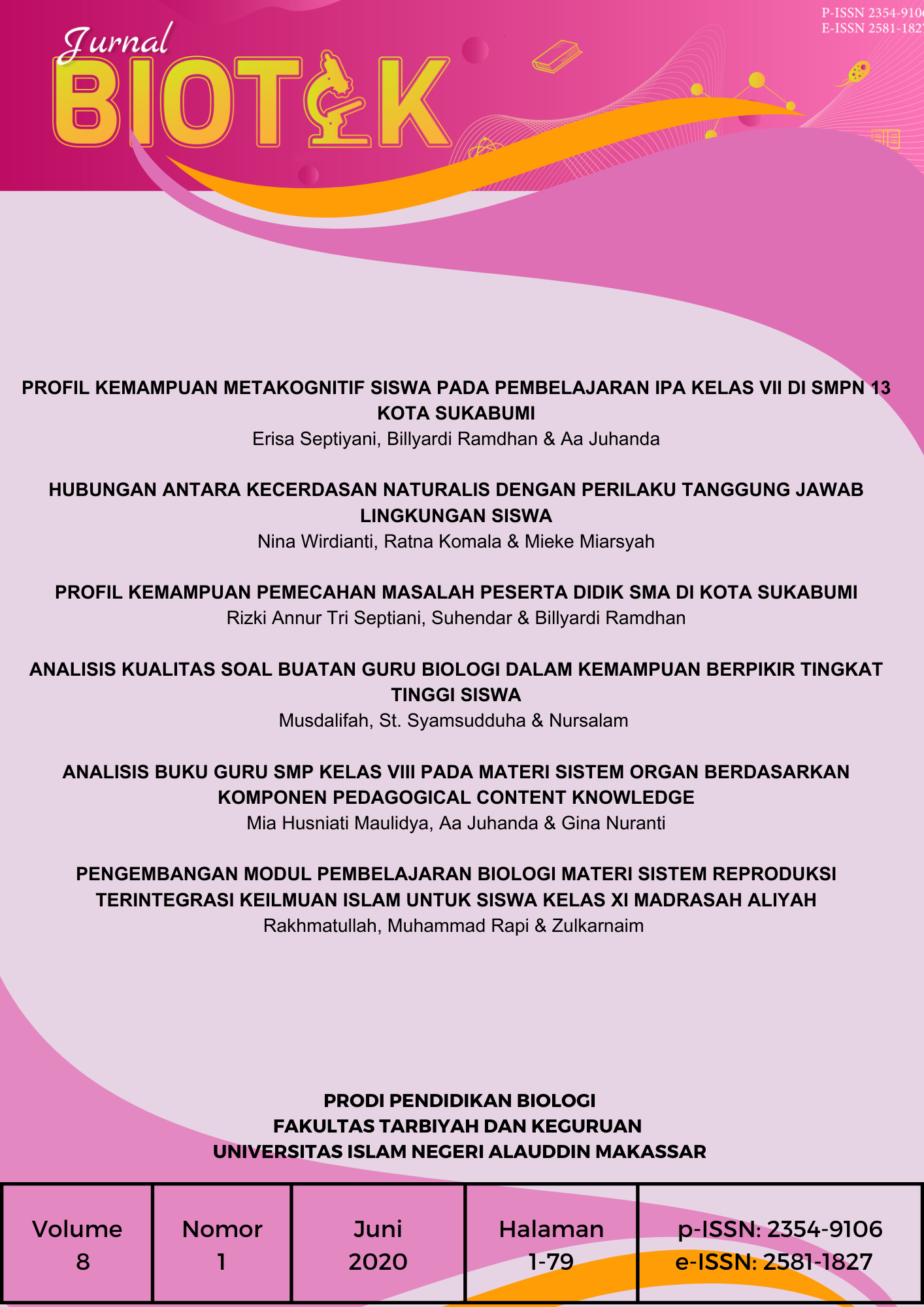ANALISIS KUALITAS SOAL BUATAN GURU BIOLOGI DALAM KEMAMPUAN BERPIKIR TINGKAT TINGGI SISWA
Abstract
This research was a quantitative descriptive study that aimed to find out the quality of questions made by teachers of SMA Negeri 10 Gowa in terms of the level of difficulty, discrimination item, and to determine the ability of these questions to measure the high-level thinking students in SMA Negeri 10 Gowa. The sample in this study was 36 students. Data collection technique was documentation, by collecting all daily questions, answer keys, and the marks of student answers of Biology class XI of SMA Negeri 10 Gowa. The instrument used in this study was a review of the Higher Order Thinking (HOTS) adapted from a module of Making HOTS Questions published by the Education and Culture Office. The data of this study were analyzed quantitatively and qualitatively. Based on the results of the quantitative analysis, the level of difficulty of the question description used in daily tests was quite good, while questions for multiple-choice categorized as good. The quality of discrimination items for both essays and multiple-choice questions categorized as poor. The results of a qualitative analysis found that there were no questions categorized as HOTS, but all of these questions had very good in use and construction of language.
Downloads
References
Anderson, L. W., & Krathwohl, D. R. (2010). Kerangka Landasan untuk Pembelajaran, Pengajaran, dan Asesmen (terjemahan Agung Prihantoro). New York: Addition Wesley Longman.(buku asli diterbitkan tahun 2001).
Ariningrum, Wening. (2016). Aspek Materi, Konstruksi dan Bahasa Pada Soal Sastra Ujian Nasional Tingkat SMK Mata Pelajaran Bahasa Indonesia Tahun 2014/2015. Skripsi. Tidak diterbitkan. Surakarta: Fakultas Keguruan dan Ilmu Pendidikan Universitas Muhammadiyah Surakarta.
Arifin, Zainal. (2013). Evaluasi Pembelajaran. Bandung: PT Remaja Rosdakarya.
Daud, F. (2012). Pengaruh Kecerdasan Emosional (EQ) dan Motivasi Belajar terhadap Hasil belajar Biologi siswa SMA 3 Negeri Kota Palopo. Jurnal Pendidikan dan Pembelajaran (JPP), 19(2), 243-255.
Gunawan. (2013). Genius Learning Strategy : Petunjuk Praktis untuk Menerapkan Accelerated Learning. Jakarta : PT Gramedia Utama.
Herlant, Y., & Nopithalia, N. (2007). Meneropong Kualitas Soal Tes Buatan Guru Biologi MTs Negeri se-Jakarta Selatan. Meneropong Kualitas Soal Tes Buatan Guru Biologi Mts Negeri Se-Jakarta Selatan.
Ichsan, I.Z., Sigit, D.V., Miarsyah, M., Ali, A., Arif, W.P., & Prayitno, T.A. (2019). HOTS-AEP: Higher Order Thinking Skills from Elementary to Master Students in Environmental Learning. European Journal of Educational Research, 8(4), 935-942. doi:10.12973/eu-jer.8.4.935
Kementrian Pendidikan dan Kebudayaan Repoblik Indonesia, “Hasil UN untuk Perbaikan kualitas Pendidikan” Offocial Website Kementrian Pendidikan dan Kebudayaan Republik Indonesia. http://www.Kementerian.Pendidikan.dan.Kebudayaan.Republik.Indonesia.html (5 Februari 2019).
Kementrian Pendidikan dan Kebudayaan Repoblik Indonesia, “ Peringkat dan Capaian PISA Indonesia Mengalami Peningkatan” Offocial Website Kementrian Pendidikan dan Kebudayaann Repoblik Indonesia. http://www.Kementerian.Pendidikan.dan.Kebudayaan.Republik.Indonesia.html (5 Mei 2018).
Kementrian Pendidikan dan Kebudayaan Repoblik Indonesia, “Mendikbud Minta Semua Pihak Hargai Hasil Ujian Nasional” Offocial Website Kementrian Pendidikan dan Kebudayaann Repoblik Indonesia. http://www.Kementerian.Pendidikan.dan.Kebudayaan.Republik.Indonesia.html (5 Mei 2018).
Mania, Sitti. (2012). Pengantar Evaluasi Pendidikan. Makassar: UIN Alauddin Press.
Nursalam. (2014) Statistika dan Pengukuran untuk Guru dan Dosen: Teori dan Aplikasinya dalam Bidang Pendidikan. Makassar: Alauddin University Press.
Sudjana, Nana (2009). Penilaian Hasil Proses Belajar Mengajar. Jakarta: PT Remaja Rosdakarya.
Rahmawati (2016) Seminar Hasil TIMSS 2015 Diagnosa Hasil untuk Perbaikan Mutu dan Peningkatan Capaian, (Naskah Presentasi yang disajikan pada Seminar Hasil Penilaian Pendidikan oleh Kementrian Pendidikan dan Kebudayaan, 14 Desember 2016), h.3-6.
Septiana, Nurul. (2016). Analisis Butir Soal Ulangan Akhir Semester (UAS) Biologi Tahun Pelajaran 2015/2016 Kelas X dan XI pada MAN SAMPIT”. Edusains 4, No.2 (2016): h. 120. https://doi.org/10.23971/eds.v4i2.514
Syamsudduha, St. (2012). Penilaian Kelas. Makassar: Alauddin Press.
Sulaiman, T., Muniyan, V., Madhvan, D., Hasan, R., Syrene, S., & Rahim, A. (2017). Implementation of higher order thinking skills in teaching of science: A case study in Malaysia. International research journal of education and sciences (IRJES), 1(1), 2550-2158.https://doi.org/10.32861/jssr.spi5.668.675
Thoha ,Chabib. 2003.Teknik Evaluasi Pendidikan. Jakarta: PT Raja Grapindo Persada.
Widana,Wayan. 2015. Modul Penyusunan Soal Higher Order Thingking Skill (HOTS) (Jakarta: Direktorat Pembinaan SMA Direktorat Jenderal Pendidkan Dasar dan Menengah Departemen Pendidikan dan Kebudayaan.
Wijaya, E. Y., Sudjimat, D. A., Nyoto, A., & Malang, U. N. (2016). Transformasi Pendidikan Abad 21 sebagai Tuntutan Pengembangan Sumber Daya Manusia di Era Global. In Prosiding Seminar Nasional Pendidikan Matematika (Vol. 1, No. 26, pp. 263-278).
Copyright (c) 2020 musdalifah Lailatussyifah, St. Syamsudduha, Nursalam Nursalam

This work is licensed under a Creative Commons Attribution-ShareAlike 4.0 International License.
Authors who publish with Jurnal Biotek agree to the following terms: Authors retain the copyright and grant Universitas Islam Negeri Alauddin Makassar right of first publication with the work simultaneously licensed under a Creative Commons Attribution License (CC BY-SA 4.0) that allows others to share (copy and redistribute the material in any medium or format) and adapt (remix, transform, and build upon the material) the work for any purpose, even commercially with an acknowledgement of the work's authorship and initial publication in Universitas Islam Negeri Alauddin Makassar. Authors are able to enter into separate, additional contractual arrangements for the non-exclusive distribution of the journal's published version of the work (e.g., post it to an institutional repository or publish it in a book), with an acknowledgement of its initial publication in Universitas Islam Negeri Alauddin Makassar. Authors are permitted and encouraged to post their work online (e.g., in institutional repositories or on their website) prior to and during the submission process, as it can lead to productive exchanges, as well as earlier and greater citation of published work (See The Effect of Open Access).

This work is licensed under a Creative Commons Attribution-ShareAlike 4.0 International License.



